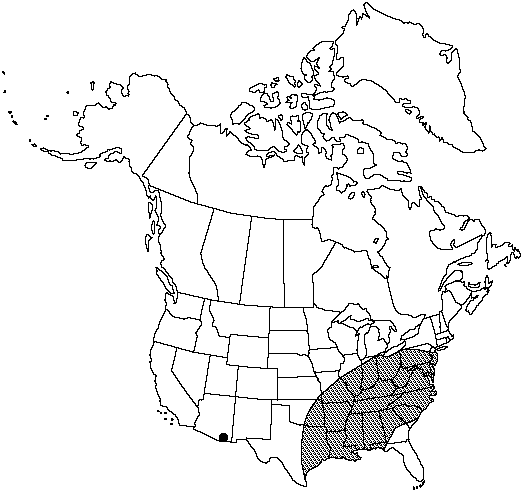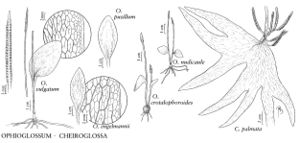Difference between revisions of "Ophioglossum vulgatum"
Sp. Pl. 2: 1062. 1753.
FNA>Volume Importer |
imported>Volume Importer |
||
| (7 intermediate revisions by 2 users not shown) | |||
| Line 8: | Line 8: | ||
}} | }} | ||
|common_names=Southern adder's-tongue;herbe sans couture | |common_names=Southern adder's-tongue;herbe sans couture | ||
| + | |special_status={{Treatment/ID/Special_status | ||
| + | |code=F | ||
| + | |label=Illustrated | ||
| + | }} | ||
|basionyms= | |basionyms= | ||
|synonyms={{Treatment/ID/Synonym | |synonyms={{Treatment/ID/Synonym | ||
|name=Ophioglossum pycnostichum | |name=Ophioglossum pycnostichum | ||
|authority=(Fernald) A.Löve & D.Löve | |authority=(Fernald) A.Löve & D.Löve | ||
| − | }}{{Treatment/ID/Synonym | + | |rank=species |
| + | }} {{Treatment/ID/Synonym | ||
|name=Ophioglossum vulgatum var. pycnostichum | |name=Ophioglossum vulgatum var. pycnostichum | ||
|authority=Fernald | |authority=Fernald | ||
| + | |rank=variety | ||
}} | }} | ||
|hierarchy=Ophioglossaceae;Ophioglossum;Ophioglossum vulgatum | |hierarchy=Ophioglossaceae;Ophioglossum;Ophioglossum vulgatum | ||
| Line 23: | Line 29: | ||
}}<!-- | }}<!-- | ||
| − | --><span class="statement" id="st- | + | --><span class="statement" id="st-undefined" data-properties=""><b>Roots </b>to 20 per plant, 0.3-0.9 mm diam., producing proliferations. <b>Stem</b> upright, to 1 cm, 3 mm diam., leaves 1 per stem. <b>Trophophore</b> stalk formed abruptly at base, to 5mm, sometimes more, 0.05 times length of trophophore blade. <b>Trophophore</b> blade erect to spreading, usually plane when alive, dark green, somewhat shiny, mostly ovate to ovate-trowel-shaped, widest in proximal half, to 10 × 4cm, firm, herbaceous, base tapering abruptly, apex rounded; venation complex-reticulate with included free veinlets in areoles. <b>Sporophores</b> arising at ground level, stalk 2-4 times length of trophophore; sporangial clusters 20-40 × 1-4 mm, with 10-35 pairs of sporangia, apiculum 1-1.5mm. <b>2n</b> =ca.1320.</span><!-- |
-->{{Treatment/Body | -->{{Treatment/Body | ||
| + | |phenology=Leaves appearing spring–early summer. | ||
|habitat=Shaded secondary woods, rich wooded slopes, forested bottomlands, and floodplain woods, south of Wisconsin glaciation | |habitat=Shaded secondary woods, rich wooded slopes, forested bottomlands, and floodplain woods, south of Wisconsin glaciation | ||
|elevation=0-800m | |elevation=0-800m | ||
|distribution=Ala.;Ariz.;Ark.;Del.;Fla.;Ga.;Ill.;Ind.;Ky.;La.;Mich.;Miss.;Mo.;N.J.;N.C.;Ohio;Okla.;Pa.;S.C.;Tenn.;Tex.;Va.;W.Va.;Mexico;Eurasia. | |distribution=Ala.;Ariz.;Ark.;Del.;Fla.;Ga.;Ill.;Ind.;Ky.;La.;Mich.;Miss.;Mo.;N.J.;N.C.;Ohio;Okla.;Pa.;S.C.;Tenn.;Tex.;Va.;W.Va.;Mexico;Eurasia. | ||
| − | |discussion=<p>In addition to characteristics given in the key, Ophioglossum vulgatum differs from O. pusillum in having an unusually persistent leathery basal leaf sheath (B.W. McAlpin 1971; W.H. Wagner Jr. 1971b) rather than an ephemeral one and in having smaller spores (mostly 35-45µm in O. vulgatum compared with 50-60 µm in O. pusillum). The chromosome number of O. vulgatum in India and Europe has been reported as 2n =480, and that may be the number of most North America populations, which are small spored. In the Appalachians, however, a distinctive large-spored form has a chromosome number of 2n =ca. 1320.</p> | + | |discussion=<p>In addition to characteristics given in the key, <i>Ophioglossum vulgatum</i> differs from <i>O. pusillum</i> in having an unusually persistent leathery basal leaf sheath (B.W. McAlpin 1971; W.H. Wagner Jr. 1971b) rather than an ephemeral one and in having smaller spores (mostly 35-45µm in <i>O. vulgatum</i> compared with 50-60 µm in <i>O. pusillum</i>). The chromosome number of <i>O. vulgatum</i> in India and Europe has been reported as 2n =480, and that may be the number of most North America populations, which are small spored. In the Appalachians, however, a distinctive large-spored form has a chromosome number of 2n =ca. 1320.</p> |
|tables= | |tables= | ||
|references= | |references= | ||
| Line 38: | Line 45: | ||
-->{{#Taxon: | -->{{#Taxon: | ||
name=Ophioglossum vulgatum | name=Ophioglossum vulgatum | ||
| − | |||
|authority=Linnaeus | |authority=Linnaeus | ||
|rank=species | |rank=species | ||
| Line 45: | Line 51: | ||
|basionyms= | |basionyms= | ||
|family=Ophioglossaceae | |family=Ophioglossaceae | ||
| + | |phenology=Leaves appearing spring–early summer. | ||
|habitat=Shaded secondary woods, rich wooded slopes, forested bottomlands, and floodplain woods, south of Wisconsin glaciation | |habitat=Shaded secondary woods, rich wooded slopes, forested bottomlands, and floodplain woods, south of Wisconsin glaciation | ||
|elevation=0-800m | |elevation=0-800m | ||
| Line 51: | Line 58: | ||
|publication title=Sp. Pl. | |publication title=Sp. Pl. | ||
|publication year=1753 | |publication year=1753 | ||
| − | |special status= | + | |special status=Illustrated |
| − | |source xml=https:// | + | |source xml=https://bitbucket.org/aafc-mbb/fna-data-curation/src/2e0870ddd59836b60bcf96646a41e87ea5a5943a/coarse_grained_fna_xml/V2/V2_106.xml |
|genus=Ophioglossum | |genus=Ophioglossum | ||
|species=Ophioglossum vulgatum | |species=Ophioglossum vulgatum | ||
| − | |||
| − | |||
| − | |||
| − | |||
| − | |||
| − | |||
| − | |||
| − | |||
| − | |||
| − | |||
| − | |||
| − | |||
| − | |||
| − | |||
| − | |||
| − | |||
| − | |||
| − | |||
| − | |||
| − | |||
| − | |||
| − | |||
| − | |||
| − | |||
| − | |||
| − | |||
| − | |||
}}<!-- | }}<!-- | ||
-->[[Category:Treatment]][[Category:Ophioglossum]] | -->[[Category:Treatment]][[Category:Ophioglossum]] | ||
Latest revision as of 21:21, 5 November 2020
Roots to 20 per plant, 0.3-0.9 mm diam., producing proliferations. Stem upright, to 1 cm, 3 mm diam., leaves 1 per stem. Trophophore stalk formed abruptly at base, to 5mm, sometimes more, 0.05 times length of trophophore blade. Trophophore blade erect to spreading, usually plane when alive, dark green, somewhat shiny, mostly ovate to ovate-trowel-shaped, widest in proximal half, to 10 × 4cm, firm, herbaceous, base tapering abruptly, apex rounded; venation complex-reticulate with included free veinlets in areoles. Sporophores arising at ground level, stalk 2-4 times length of trophophore; sporangial clusters 20-40 × 1-4 mm, with 10-35 pairs of sporangia, apiculum 1-1.5mm. 2n =ca.1320.
Phenology: Leaves appearing spring–early summer.
Habitat: Shaded secondary woods, rich wooded slopes, forested bottomlands, and floodplain woods, south of Wisconsin glaciation
Elevation: 0-800m
Distribution

Ala., Ariz., Ark., Del., Fla., Ga., Ill., Ind., Ky., La., Mich., Miss., Mo., N.J., N.C., Ohio, Okla., Pa., S.C., Tenn., Tex., Va., W.Va., Mexico, Eurasia.
Discussion
In addition to characteristics given in the key, Ophioglossum vulgatum differs from O. pusillum in having an unusually persistent leathery basal leaf sheath (B.W. McAlpin 1971; W.H. Wagner Jr. 1971b) rather than an ephemeral one and in having smaller spores (mostly 35-45µm in O. vulgatum compared with 50-60 µm in O. pusillum). The chromosome number of O. vulgatum in India and Europe has been reported as 2n =480, and that may be the number of most North America populations, which are small spored. In the Appalachians, however, a distinctive large-spored form has a chromosome number of 2n =ca. 1320.
Selected References
None.
